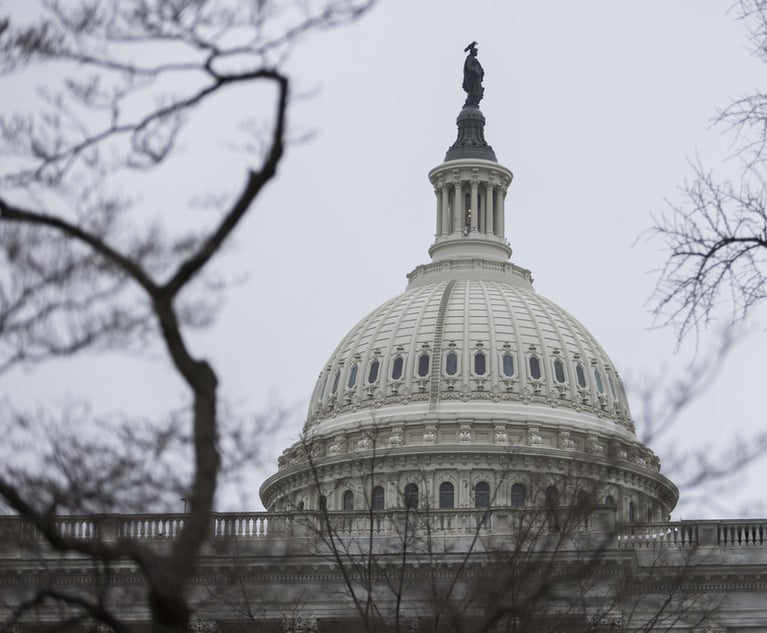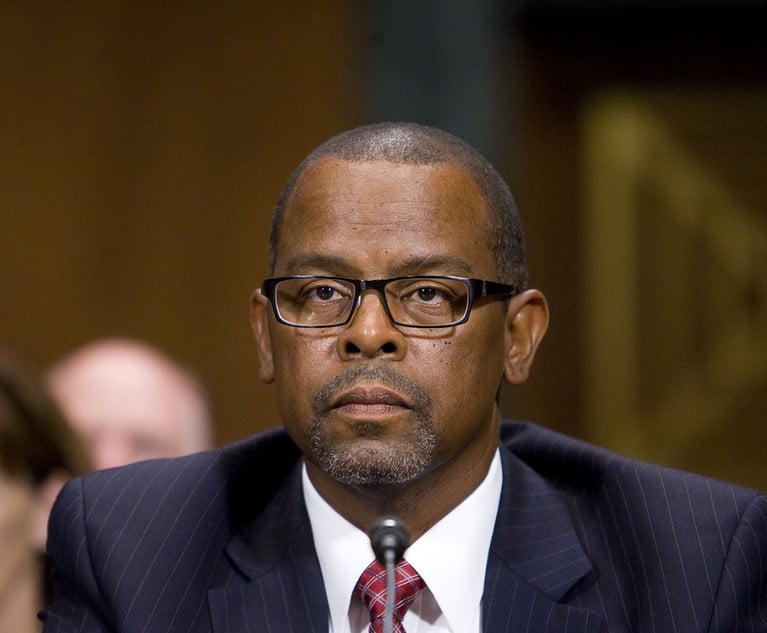Becerra's Campaign Spot Inside Third District Courthouse Raises Questions
Dave Jones is raising questions about the propriety of a Xavier Becerra campaign ad inside the Third District Courthouse. Becerra's campaign manager called Jones's complaint a "desperate attempt" to save a "floundering campaign."
May 21, 2018 at 05:49 PM
5 minute read
California Attorney General candidate Dave Jones has asked television stations to stop airing campaign ads for Democratic rival Xavier Becerra, alleging that portions of the 30-second spots were improperly filmed in the Sacramento building that houses the Third District Court of Appeal.
Jones, the state insurance commissioner, also filed a complaint with the Fair Political Practices Commission and asked the attorney general's office to appoint a special counsel to investigate his allegations about four Becerra TV commercials and a print mailer.
Becerra's campaign obtained a permit to shoot the ads from the California Film Commission. The filming took place on April 26 with a 12-member crew working in and around the building, which is home to some state library operations as well as the Third District court.
Becerra campaign manager Dana Williamson called Jones' complaint a “desperate attempt” to save a “floundering campaign.”
At the heart of Jones' complaint is Government Code Section 8314, which bars state officers from using state resources, including buildings, for campaign activity.
One of the ads in question features Becerra chatting with Gov. Jerry Brown outside the five-story Stanley Mosk Library & Courts building. Later, the two walk down an interior hallway, past framed photos of Third District Justices Elena Duarte and William Murray Jr. on a wall.
In several frames, Becerra lawyerly stands over people sitting at desks in the historic, and empty, Third District courtroom. Brown narrates the ad, reminding viewers that he appointed Becerra attorney general in 2017.
“Most of the voter communication Mr. Becerra has done in this campaign benefits from these illegally staged campaign commercials in this state building and state courtroom,” Jones said Monday at a press conference held in the Sacramento office of the Nossaman law firm, which is representing his campaign.
Williamson, the Becerra campaign manager, said they went through “the usual legal process just as any private citizen is entitled to do.” The permit from the film commission specifically authorized shooting inside the courthouse.
The Fair Political Practices Commission has the authority to fine political candidates for campaign violations. Prosecutors can also seek civil damages equal to three times the value of the unlawful use of the public resource in question under Section 8314.
Jones' complaint highlights the confusing ownership realities of California's courtrooms. The judicial branch holds deeds to many courthouses around the state, and the Judicial Council allows filming in them under certain circumstances. Requests are weighed against eight sets of approval considerations, including “public trust and confidence in the impartiality, lack of bias or discrimination, and fairness of the judicial system.”
But some courthouses, such as the one inside the Third District's Stanley Mosk building in Sacramento, are owned and operated by the state.
The state Department of General Services “allows for private, commercial filming on state property so long as the filming does not disrupt state business and the proper permits have been obtained from the California Film Commission,” the agency's deputy director, Monica Hassan, said.
California Film Commission executive director Amy Lemisch said permits are issued so long as applicants get necessary approvals from relevant state agencies—in this case, the California Highway Patrol. Permits are available to any qualified applicant and the commission does not discriminate based on the planned content of the ad or the view of the filmer, she said.
The film commission's website does say that “filming requests for Appellate Courtrooms located within state office buildings will not be considered.” Lemisch on Monday did not immediately explain the apparent discrepancy between that statement and the commission's decision to issue a permit to the Becerra campaign.
Amber Maltbie, a partner in Nossaman's public policy group, said Section 8314's ban on campaign activity in public buildings “supersedes any permit or permission that Becerra was able to obtain from the film commission.”
It's unclear who, if anyone, from the Third District authorized filming in the courtroom. Oral arguments were not scheduled for the day the ad was shot, according to the court's calendar. Vance Raye, the administrative presiding justice for the Third District, did not return messages seeking comment.
State law does allow for the “incidental and minimal use” of public property for campaign activity. Does a one-day shoot in an empty courtroom qualify under the exemption terms? Under the law, the ultimate deciders are prosecutors, including the attorney general, district attorneys and attorneys representing California's largest cities.
Read more:
This content has been archived. It is available through our partners, LexisNexis® and Bloomberg Law.
To view this content, please continue to their sites.
Not a Lexis Subscriber?
Subscribe Now
Not a Bloomberg Law Subscriber?
Subscribe Now
NOT FOR REPRINT
© 2025 ALM Global, LLC, All Rights Reserved. Request academic re-use from www.copyright.com. All other uses, submit a request to [email protected]. For more information visit Asset & Logo Licensing.
You Might Like
View All
'Serious Disruptions'?: Federal Courts Brace for Government Shutdown Threat
3 minute read
House Passes Bill to Add Federal Judgeships in Face of Biden Veto Threat

‘Really Deflating’: Judges React to Biden Threat to Veto New Judgeships Bill

Santa Clara County Superior Court Authorizes Electronic Recording of Proceedings
4 minute readTrending Stories
- 1Bathroom Recording Leads to Lawyer's Disbarment: Disciplinary Roundup
- 2Conn. Supreme Court: Workers' Comp Insurance Cancellations Must Be Unambiguous
- 3To Avoid Conflict, NYAG Hands Probe Into Inmate's Beating Death to Syracuse-Area DA
- 4Scripture-Quoting Employee Sues Company for Supporting LGBTQ Pride
- 5Judge's Suicide Sparks Chatter Over Judicial Election
Who Got The Work
Michael G. Bongiorno, Andrew Scott Dulberg and Elizabeth E. Driscoll from Wilmer Cutler Pickering Hale and Dorr have stepped in to represent Symbotic Inc., an A.I.-enabled technology platform that focuses on increasing supply chain efficiency, and other defendants in a pending shareholder derivative lawsuit. The case, filed Oct. 2 in Massachusetts District Court by the Brown Law Firm on behalf of Stephen Austen, accuses certain officers and directors of misleading investors in regard to Symbotic's potential for margin growth by failing to disclose that the company was not equipped to timely deploy its systems or manage expenses through project delays. The case, assigned to U.S. District Judge Nathaniel M. Gorton, is 1:24-cv-12522, Austen v. Cohen et al.
Who Got The Work
Edmund Polubinski and Marie Killmond of Davis Polk & Wardwell have entered appearances for data platform software development company MongoDB and other defendants in a pending shareholder derivative lawsuit. The action, filed Oct. 7 in New York Southern District Court by the Brown Law Firm, accuses the company's directors and/or officers of falsely expressing confidence in the company’s restructuring of its sales incentive plan and downplaying the severity of decreases in its upfront commitments. The case is 1:24-cv-07594, Roy v. Ittycheria et al.
Who Got The Work
Amy O. Bruchs and Kurt F. Ellison of Michael Best & Friedrich have entered appearances for Epic Systems Corp. in a pending employment discrimination lawsuit. The suit was filed Sept. 7 in Wisconsin Western District Court by Levine Eisberner LLC and Siri & Glimstad on behalf of a project manager who claims that he was wrongfully terminated after applying for a religious exemption to the defendant's COVID-19 vaccine mandate. The case, assigned to U.S. Magistrate Judge Anita Marie Boor, is 3:24-cv-00630, Secker, Nathan v. Epic Systems Corporation.
Who Got The Work
David X. Sullivan, Thomas J. Finn and Gregory A. Hall from McCarter & English have entered appearances for Sunrun Installation Services in a pending civil rights lawsuit. The complaint was filed Sept. 4 in Connecticut District Court by attorney Robert M. Berke on behalf of former employee George Edward Steins, who was arrested and charged with employing an unregistered home improvement salesperson. The complaint alleges that had Sunrun informed the Connecticut Department of Consumer Protection that the plaintiff's employment had ended in 2017 and that he no longer held Sunrun's home improvement contractor license, he would not have been hit with charges, which were dismissed in May 2024. The case, assigned to U.S. District Judge Jeffrey A. Meyer, is 3:24-cv-01423, Steins v. Sunrun, Inc. et al.
Who Got The Work
Greenberg Traurig shareholder Joshua L. Raskin has entered an appearance for boohoo.com UK Ltd. in a pending patent infringement lawsuit. The suit, filed Sept. 3 in Texas Eastern District Court by Rozier Hardt McDonough on behalf of Alto Dynamics, asserts five patents related to an online shopping platform. The case, assigned to U.S. District Judge Rodney Gilstrap, is 2:24-cv-00719, Alto Dynamics, LLC v. boohoo.com UK Limited.
Featured Firms
Law Offices of Gary Martin Hays & Associates, P.C.
(470) 294-1674
Law Offices of Mark E. Salomone
(857) 444-6468
Smith & Hassler
(713) 739-1250






